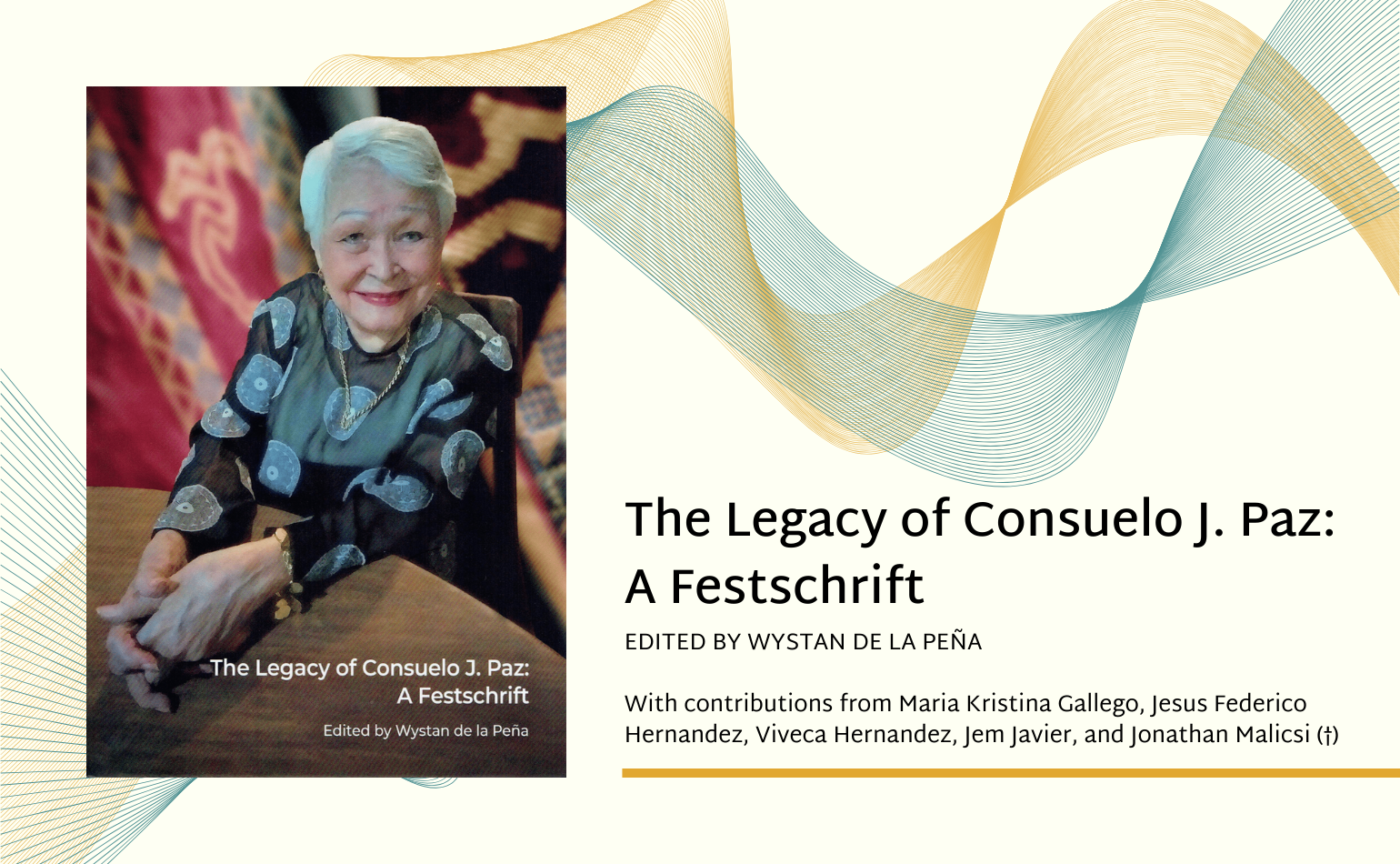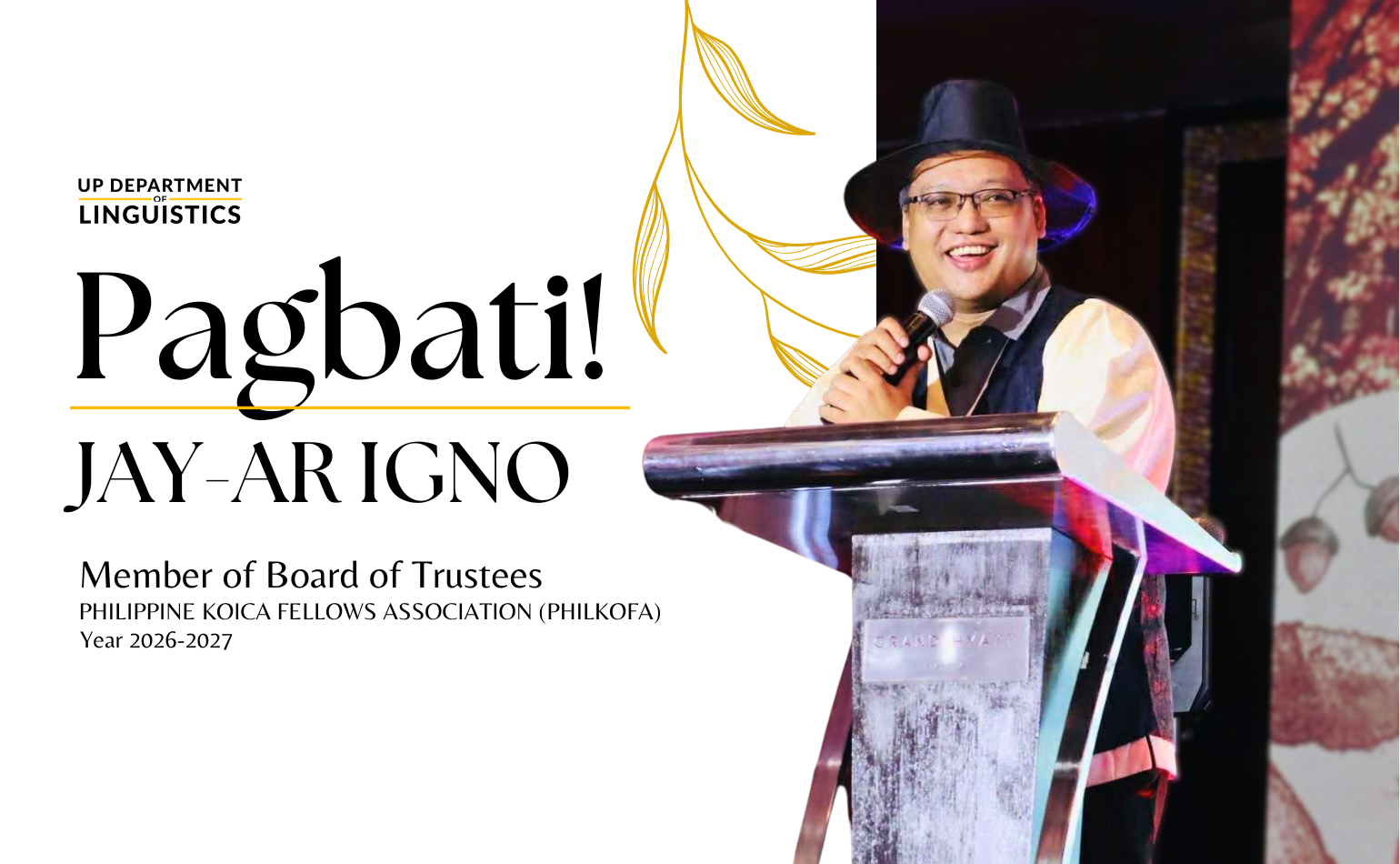
Five faculty members from the Department of Linguistics honored Professor (Ret.) and Former College of Social Sciences and Philosophy (CSSP) Dean, Dr. Consuelo J. Paz, through the recently-released The Legacy of Consuelo J. Paz: A Festschrift, edited by Prof. Wystan de la Peña of the UP Department of European Languages and published by the UP Center for International Studies (CIS). The five linguistic essays included in the anthology are as follows: “Lexical Sources for Ibatan” by Asst. Prof. Maria Kristina S. Gallego; “Sosyolinggwistikong Pagsusuri sa Lexical Choice ng Kontemporaryong Gamit ng Wikang Filipino” by Asst. Prof. Jem R. Javier; “Atay, The Heart of the Matter” by Assoc. Prof. Jesus Federico C. Hernandez; “Tamaan Ka ng Kidlat! — Tsibi, Parusa ng Ayta” by Dr. Viveca V. Hernandez (together with Dr. Cynthia Neri Zayas of UP CIS); and “Mga Pangatnig at ang Mapanuring Pag-iisip” by the late Prof. Emeritus Jonathan C. Malicsi.
In her essay titled, “Lexical Sources for Ibatan,” Asst. Prof. Gallego analyzes contact-induced change in the lexicon of Ibatan, a northern Philippine language, by exploring the extent to which various source languages have influenced the Ibatan lexicon and how this reflects the history and experiences of the community. She argues that insights from analyzing the mechanisms that govern both language contact and change should inform our work of reconstructing the deeper linguistic and cultural history of the Philippines—subjects which Dean Paz devoted much of her life to studying.
Asst. Prof. Javier focuses his paper titled, “Sosyolinggwistikong Pagsusuri sa Lexical Choice ng Kontemporaryong Gamit ng Wikang Filipino,” on describing the status of the actual use of Filipino, and the influence of English and Spanish, among UP Diliman students. He highlights the importance of accounting for the speakers who actually use the language, and not just the ideologies and agendas of policymakers and agencies, in crafting, promoting, and implementing what Dean Paz envisions as a truly democratic language policy in the country.
Reminiscing Dean Paz’ (2008) landmark work on the lexico-historical reconstructions of proto-Philippine etyma relating to well-being and anguish—ginhawa, kapalaran, and dalamhati, Assoc. Prof. J.F.C. Hernandez’s ethnolinguistic essay delves into the term dalamhati and its association with the liver (atay) as a source of emotion. He also applies principles and procedures from diachronic linguistics that Dean Paz employs in attempting to not only characterize and identify core categories that define the Filipino, but also to discover Pan-Philippine categories that indicate affinity and place in the Austronesian language family. Assoc. Prof. J.F.C. Hernandez’s paper was originally presented at the Inaugural Consuelo J. Paz Lecture, organized by the Department, and held in 2019.
The paper titled, “Tamaan Ka ng Kidlat! — Tsibi, Parusa ng Ayta,” is the result of Dr. V.V. Hernandez and Dr. Zayas’s collaborative research project on the Ayta groups in Mt. Pinatubo. Unpacking the concept of matsibi [which they define as ‘to be struck by lightning for committing a taboo or a wrongdoing’] by gathering narratives on this concept given by Ayta community members that they interviewed and studying the folklore surrounding it, they remark that cultural concepts such as tsibi provide insights into the Ayta groups’ relationship with nature and how they hold nature in high regard; such that they believe that any act that exploits their natural surroundings will bring about misfortune to the offender.
In one of his last papers, the late Prof. Emeritus Malicsi in his essay titled, “Mga Pangatnig at ang Mapanuring Pag-iisip,” applies logical analysis in describing the different types and functions of coordinating and subordinating conjunctions, as well as the conjunctives in Filipino. The article describes how the use of different conjunctions yields different interpretations of sentences, which could lead to a breakdown in communication if the construction does not match the intended message. Prof. Emeritus Malicsi connects this to the importance of critical thinking in ensuring the truthfulness and logic of conclusions one might derive from the interpretation of various messages, and he extends this as well to making life decisions.
In his introductory remark, editor Prof. de la Peña mentions that the term festschrift, like its original meaning in German, is a feast of writing, a collection of essays and recollections in honor of Dean Paz by her colleagues from the Department, UP CIS, and the various units in the University throughout her four decades of service. Prof. de la Peña also notes that the collected essays showcase the vast influence of Dean Paz on the next generation of academics, who are continuing her legacy in doing research on the linguistic genealogy and development of Philippine languages and dialects; probing the role of language and our indigenous knowledge, beliefs, and culture to our Filipino identity and the nationhood of the Philippines; and underscoring the value of the Asian perspective in general theorizing through the study of Southeast Asian culture and history.
The festschrift was given a soft launch on 17 March 2021, in celebration of Dean Paz’ 88th birthday, and was officially released to the public this month. Please contact UP CIS for details on how to get a copy of the book.
Published by UP Department of Linguistics



